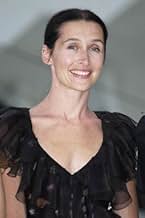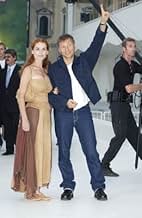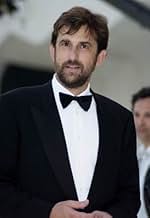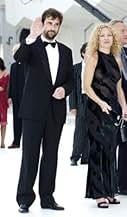IMDb RATING
6.3/10
2.5K
YOUR RATING
A New York thief, a tough-as-nails hundred-year-old woman, two brothers from the Wild West, a Macedonian revolutionary and a beautiful pregnant woman, all cross paths in a tale that spans tw... Read allA New York thief, a tough-as-nails hundred-year-old woman, two brothers from the Wild West, a Macedonian revolutionary and a beautiful pregnant woman, all cross paths in a tale that spans two continents and three centuries.A New York thief, a tough-as-nails hundred-year-old woman, two brothers from the Wild West, a Macedonian revolutionary and a beautiful pregnant woman, all cross paths in a tale that spans two continents and three centuries.
- Awards
- 1 nomination total
Joseph Mosso
- Church bell
- (as Joe Mosso)
- Director
- Writer
- All cast & crew
- Production, box office & more at IMDbPro
Featured reviews
Firstly, I'm a huge David Wenham fan. Didn't read anything about the plot before renting it. I was really surprised by the film's beginning, having no cowboys or Macedonians in sight. This was an interesting Rashomon-like tale, but I really didn't care for two of the storytellers - the old lady and the burglar. I think the story would've worked better just told from the two brothers point of view; no silly subplot about gangsters and gold coins.
Joseph Fiennes is hardly in the movie, and when he is, he mostly quotes the Bible in a horrid accent. David Wenham's American accent was even worse. For me to say anything negative about Wenham...it must be really bad. He also screamed in anguish at the sky so much I could only think "Mendooooza!" (from the Simpsons' "McBain" movies). Visually, this film was very beautiful, not just because of a handsome lead either, but very engaging use of colors, costumes and landscape. The way images from the past and future collided was very cool. The gun-fight scenes were well choreographed, and pretty damn bloody. Perhaps that's why I found the old lady's section less interesting - less action, less exotic locations.
A few laughs, a few gasps, a bit of sex, a lot of violence, but just too thin of a story. If you arrange the brothers' tale minus the gimmicky time-jumps, the movie would be about an hour long, not 2+ hours. I can't figure why the director didn't just fatten the characters and context of their story and tell it straight through. This is a movie about storytelling, but viewers need a better story. And David Wenham deserves a better movie. Preferably one where he can speak more naturally.
Joseph Fiennes is hardly in the movie, and when he is, he mostly quotes the Bible in a horrid accent. David Wenham's American accent was even worse. For me to say anything negative about Wenham...it must be really bad. He also screamed in anguish at the sky so much I could only think "Mendooooza!" (from the Simpsons' "McBain" movies). Visually, this film was very beautiful, not just because of a handsome lead either, but very engaging use of colors, costumes and landscape. The way images from the past and future collided was very cool. The gun-fight scenes were well choreographed, and pretty damn bloody. Perhaps that's why I found the old lady's section less interesting - less action, less exotic locations.
A few laughs, a few gasps, a bit of sex, a lot of violence, but just too thin of a story. If you arrange the brothers' tale minus the gimmicky time-jumps, the movie would be about an hour long, not 2+ hours. I can't figure why the director didn't just fatten the characters and context of their story and tell it straight through. This is a movie about storytelling, but viewers need a better story. And David Wenham deserves a better movie. Preferably one where he can speak more naturally.
Milcho Manchevski establishes new guidelines for independent movie makers, successfully balancing between Hollywood commercial and the independent art film. Only few compromises and hybrids like this have proven worth filming (and watching) and I was pleasantly surprised with the outcome.
First of all, there was the careful choice of names - Luke and Elijah (biblical names) opposed to the prostitute Lilith (female demon). No wonder that Lilith was in so many ways connected with water and finally she drowned. Than, there's Neda (from an old Macedonian poem "Serdarot" by Grigor Prlichev, awarded first prize at Athens). Then, a thing which impressed me was the short appearance of certain characters like Sigmund Freud, Pablo Picasso and Josip Broz Tito. Manchevski has used his old "trick" from his first film "Before the Rain" - non-linear time, but while in "Before the rain" the explanation was "The circle is not round, time never dies" in "Dust" it is "The centuries do not follow up each other but coexist like parallel universes".
Repentance was an important motif in the movie, especially the repentance of Luke and Edge.
Certain scenes have moved me, the scene in the hospital when Angela dies and the nurse is asking Edge what is he to her... The scene in Macedonia, when the women are laundering the carpets on a rocky waterfall (Mariovo)... And another thing - me as a Macedonian have always been brought up with the notion that our freedom fighters were noble men who were usually victims of blood thirsty Turks, but this movie had an interesting point that they were all butchers and murderers whose only lust is not freedom or fight against oppression but GOLD!
Probably this movie doesn't have the prophetic touch of "Before the rain" clearly displayed in the current political situation in Macedonia, but there's again the scene with Albanian gangs killing innocent Macedonian cattle breeders.
And another thing - both Angela and Luke are mocking the official clerical (church) "authorities", when Angela refuses the confession of the catholic priest on her death bed and when Luke kills the local orthodox priests offering assistance in the negotiations with the Turks (by the way, the priest is a traitor, which questions another illusion of mine and my generation - that the priests and the Church have been very active in protecting the Macedonian villagers from oppression and torment).
I know one thing for sure - that as soon as I am able I will use my proud privilege to be a Macedonian and visit Mariovo, where a part of the movie was made, and especially the bridge where the Turks attempted to pass so many times during the 17-th century and did not succeed.
The tension seems to fade at some points and that's why the rate of "9" form my user's vote, but still, this is an excellent complete product, made with the touch of perfect craftsmanship.
First of all, there was the careful choice of names - Luke and Elijah (biblical names) opposed to the prostitute Lilith (female demon). No wonder that Lilith was in so many ways connected with water and finally she drowned. Than, there's Neda (from an old Macedonian poem "Serdarot" by Grigor Prlichev, awarded first prize at Athens). Then, a thing which impressed me was the short appearance of certain characters like Sigmund Freud, Pablo Picasso and Josip Broz Tito. Manchevski has used his old "trick" from his first film "Before the Rain" - non-linear time, but while in "Before the rain" the explanation was "The circle is not round, time never dies" in "Dust" it is "The centuries do not follow up each other but coexist like parallel universes".
Repentance was an important motif in the movie, especially the repentance of Luke and Edge.
Certain scenes have moved me, the scene in the hospital when Angela dies and the nurse is asking Edge what is he to her... The scene in Macedonia, when the women are laundering the carpets on a rocky waterfall (Mariovo)... And another thing - me as a Macedonian have always been brought up with the notion that our freedom fighters were noble men who were usually victims of blood thirsty Turks, but this movie had an interesting point that they were all butchers and murderers whose only lust is not freedom or fight against oppression but GOLD!
Probably this movie doesn't have the prophetic touch of "Before the rain" clearly displayed in the current political situation in Macedonia, but there's again the scene with Albanian gangs killing innocent Macedonian cattle breeders.
And another thing - both Angela and Luke are mocking the official clerical (church) "authorities", when Angela refuses the confession of the catholic priest on her death bed and when Luke kills the local orthodox priests offering assistance in the negotiations with the Turks (by the way, the priest is a traitor, which questions another illusion of mine and my generation - that the priests and the Church have been very active in protecting the Macedonian villagers from oppression and torment).
I know one thing for sure - that as soon as I am able I will use my proud privilege to be a Macedonian and visit Mariovo, where a part of the movie was made, and especially the bridge where the Turks attempted to pass so many times during the 17-th century and did not succeed.
The tension seems to fade at some points and that's why the rate of "9" form my user's vote, but still, this is an excellent complete product, made with the touch of perfect craftsmanship.
I do not understand why people try to comprehend this movie as a real-life story, because there are many "hints" telling viewers not to do so - photographs with characters from different epochs together, modern airplane flying over Macedonia at the beginning of twentieth century, etc. - even the sarcastic homage to spaghetti-western tradition ("hero" killing six or seven people with a single bullet)... In my opinion, it should be viewed as a story about human souls, their connection through time and space, about human fate, where main character, although ill-natured, was "sent by destiny" to a far-away land to do the good deed of his life (Elijah's decision to save life of Macedonian rebel's child at the end of the movie looks more like being driven by some irrational then rational force).
The movie also has its point picturing the way westerns see (and saw) Balkan area - as a confusing battleground where everyone have there objectively justifiable reasons to think they are right - making the whole picture far from "black and white". Still, the "western people" come to do their own business (collect the gold), but end up in a completely different connection with people and territory... Personally, I did not like characters of Edge and Angela, in my opinion they are built as clichés with no good reason. On the other hand, characters of two cowboys, as well as Turkish gang-soldiers and Corto Maltese (comic-book figure well known in Europe), built as stereotypes, perfectly fill the sarcastic, humorous attitude of Filmmaker on profane observance of life...
The movie also has its point picturing the way westerns see (and saw) Balkan area - as a confusing battleground where everyone have there objectively justifiable reasons to think they are right - making the whole picture far from "black and white". Still, the "western people" come to do their own business (collect the gold), but end up in a completely different connection with people and territory... Personally, I did not like characters of Edge and Angela, in my opinion they are built as clichés with no good reason. On the other hand, characters of two cowboys, as well as Turkish gang-soldiers and Corto Maltese (comic-book figure well known in Europe), built as stereotypes, perfectly fill the sarcastic, humorous attitude of Filmmaker on profane observance of life...
It's easy to miss what DUST does with the Western's clichés. The movie is a kind of rumination in modern, international terms on THE WILD BUNCH, with some problems (e.g., Joseph Fiennes's Southern accent and arguably too many bloodbaths) and with some remarkable achievements. Chief among these is Manchevski's managing to keep several threads hanging because he pays us the compliment of assuming that we are paying attention, waiting for culmination, like the youngster who finally proves to be the movie's protagonist. We need very few details to make the important connections. The lad is a low-class thief in hock to dirty cops; he confronts an old broad far tougher than he is, who sees his resemblance to the Luke of her memory, a mercenary cowboy who found it easier to kill than love. As she begins a sharp-witted decline to death, she tells Luke's story. The story is full of traps. We think Luke fled to Macedonia because he loves the prostitute his sinister, found-again brother (Fiennes) has married. But Luke and his life are more complicated than that, as we gradually learn, circling through past, present, and the minds of several participants. Manchevski values images, cutting to the old lady's photos from the past, mixing times and spaces within the frame. He insists that we are watching the old lady's story, not even a pretense at reality. At last the youngster takes up the challenge and Luke redeems himself in a final confrontation whose truth is in fiction's need to resolve the central issue: here, that memory is a story which makes time come round to emphasize the dark ironies and pains from which we keep trying to protect ourselves.
After having read some reviews of 'Dust' I was not sure if I wanted to see it or not. However, the "David Wenham infatuation" prevailed in the end, and I went as far as to actually purchase the film. It was money well spent, you could say. While the movie would not appeal to general audiences, it left me awestruck. I ended up watching it again, on the same night.
"Wow" is how I describe feeling after the credits rolled (the first and the second time). I don't want to spoil anything for those who have not seen the movie, so I'll just stick to my reactions to it. There was laughter, there were tears, there might have been an "eww" once or twice, there were definitely lustful thoughts of David Wenham (he's rather cute, you know). Acting was superb, though I'd like a few words with the 'dialect coach' (hint: the leads are not American). All in all, a great movie. I highly recommend seeing it at least once.
"Wow" is how I describe feeling after the credits rolled (the first and the second time). I don't want to spoil anything for those who have not seen the movie, so I'll just stick to my reactions to it. There was laughter, there were tears, there might have been an "eww" once or twice, there were definitely lustful thoughts of David Wenham (he's rather cute, you know). Acting was superb, though I'd like a few words with the 'dialect coach' (hint: the leads are not American). All in all, a great movie. I highly recommend seeing it at least once.
Did you know
- TriviaDust caused quite a stir when it premiered. A number of European critics viewed Manchevski's film as an extension of his recent op-ed piece in The Guardian. The op-ed asked NATO to take responsibility for a civil war in his homeland Macedonia - even though Dust was finished before the war even began.
- GoofsThe old woman Angela's (Rosemary Murphy) refrigerator dispenses the gold coins from the story, even though they were all scattered at the Turkish camp by Luke (David Wenham) when he came for Neda (Nikolina Kujaca).
- How long is Dust?Powered by Alexa
Details
- Release date
- Countries of origin
- Official site
- Languages
- Also known as
- Justice de l'ouest
- Filming locations
- Production companies
- See more company credits at IMDbPro
Box office
- Budget
- $11,000,000 (estimated)
- Gross worldwide
- $108,698
- Runtime2 hours 7 minutes
- Color
- Sound mix
- Aspect ratio
- 1.85 : 1
Contribute to this page
Suggest an edit or add missing content
































